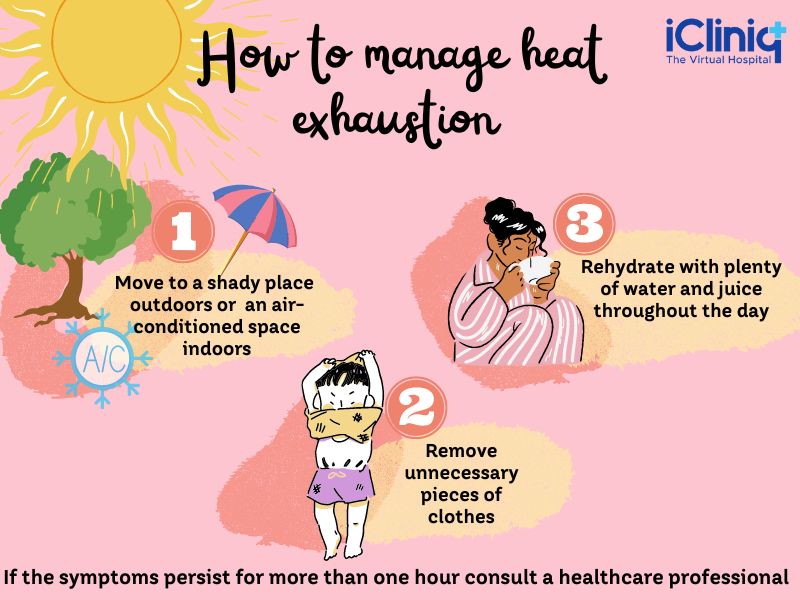Introduction:
There are three major types of heat-related illnesses: heat cramps, heat exhaustion, and heatstroke. Heat cramps are the mildest form among these three aforementioned heat-related illnesses, while heat stroke might be life-threatening. Heat exhaustion is a form that is moderate among other heat-related illnesses. This condition occurs when your body is exposed to too much heat.
What Exactly Is Heat Exhaustion?
Heat exhaustion is a not so rare yet preventable condition of the body that occurs when a person is exposed to high heat levels. This condition occurs especially when high humidity meets high levels of heat accompanied by high-intensity physical activities. Heat exhaustion is more often seen with dehydration. Fortunately, this condition is preventable and is not life-threatening as heat stroke. However, unmanaged heat exhaustion might lead to heatstroke, which might be fatal.
What Causes Heat Exhaustion?
Our body has its air conditioning system, sweat. When exposed to high temperatures, your body cools itself by sweating. Sweating causes you to lose some levels of water and sodium. When you are exposed to high levels of heat and high levels of humidity while doing physical activity, it becomes too much for your body to handle. It struggles to cool down itself, resulting in symptoms like dizziness, fatigue, cramps, etc. This condition is called heat exhaustion.
What Are the Risk Factors of Heat Exhaustion?
Heat exhaustion is more common than you might think it is. It happens when you over-exert yourself with high-intensity sports or workouts under high temperatures and humidity. In addition, heat exhaustion occurs when your body finds it hard to cool itself down.
Following are some of the risk factors for heat exhaustion:
-
Age: Kids below the age of four and older adults above the age of 65 find it hard to cope with high heat and humidity. Therefore, they are at a higher risk of suffering from heat exhaustion.
-
Excessive Alcohol Intake: Excess intake of alcohol generally leads to dehydration. It also makes it hard for your body to regulate temperatures, which, as a result, might lead to heat exhaustion.
-
Over-Exertion: People who overexert themselves with high-intensity sports or workouts during a hot day are at a higher risk of developing heat exhaustion. Also, if a person who usually plays or exercises in a cooler environment is suddenly exposed to high heat and high humid conditions may develop heat exhaustion. Also, wearing heavy clothes during high temperatures leads to heat exhaustion.
-
Medications: Certain medications like antihypertensives (beta-blockers), medications prescribed to help heart failures (diuretics - these medications reduce the amount of fluid in the body, which might lead to dehydration), and chemotherapy drugs (drugs that treat cancer) can cause heat exhaustion. Some commonly prescribed medications can also cause symptoms like vomiting, diarrhea, and dehydration. Such drugs may lead to heat exhaustion.
-
Obesity: People who are obese (overweight) are at a higher risk of developing heat exhaustion, especially when exposed to high temperatures.
What Are the Signs and Symptoms of Heat Exhaustion?
The signs and symptoms of heat exhaustion might start slowly and then progress to heat stroke if not treated soon.
Following are the primary two types of heat exhaustion and its common signs:

Other common signs and symptoms are as follows:
-
Dizziness.
-
Lightheadedness.
-
Fever (increased body temperature).
-
Excessive sweating.
-
Moist and cold skin.
-
Fatigue.
-
Tiredness.
-
Confusion.
-
Vomiting might occur in some.
-
Rapid, weak pulse.
-
Muscle cramps.
-
Abdominal cramps.
-
Dark-colored urine (a common sign of dehydration).
-
Fainting (syncope).
-
Low blood pressure (while standing up).
-
Rapid shallow breath.
-
Pale skin.
-
Heat edema (swollen ankles and feet can occur).
How to Manage Heat Exhaustion?
If a person you know or you experience any of the symptoms mentioned above, make sure to follow the below-mentioned steps:
-
Rehydrate with plenty of water and juice throughout the day (avoid caffeine or alcohol-containing drinks).
-
Moving to a shady place if you are outdoors or moving to an air-conditioned space is better if present.
- Remove unnecessary pieces of clothes if overdressed.
-
If the symptoms persist for more than one hour or if it worsens, consult a doctor immediately.

How to Prevent Heat Exhaustion?
Following are the few steps to prevent yourself or your loved ones from heat exhaustion,
-
When going out for sports or workouts during hot summers, wear loose-fitting airy garments. Also, avoid layering too many garments to increase body temperature.
-
Applying sufficient sunscreen of a minimum of SPF 30 is a must to prevent sunburns.
-
If you are a sports person, carry adequate water or electrolyte-rich sports drinks to have in between your sports, as this will help prevent dehydration.
-
Take reasonable notice of yourself if you experience any heat-related problems after starting any medication. If so, consult a doctor immediately to change the dosage or the drug itself.
-
If you had a recent history of heat exhaustion, you might be sensitive to high temperatures for a few weeks after the episode. Therefore, take precautions to avoid going to scorching conditions.
-
Avoid excess drinking of caffeinated beverages or alcohol as it may lead to dehydration.
Conclusion:
Though heat exhaustion is not as severe as heat stroke, delayed care might cause the progression of this condition to heatstroke. The good news is that heat exhaustion, and most heat-related illnesses can be prevented by following the above-mentioned preventive measures. Keep yourself hydrated during hot summer seasons and wear climate-appropriate clothes to reduce the risks of developing heat-related illnesses. If you experience the symptoms mentioned above for an extended period or often, visit your general physician to avoid further complications.












